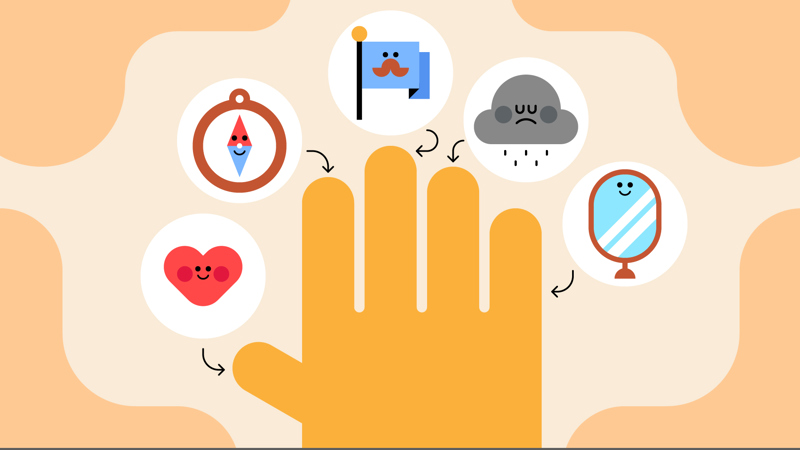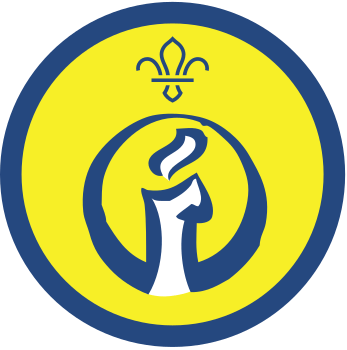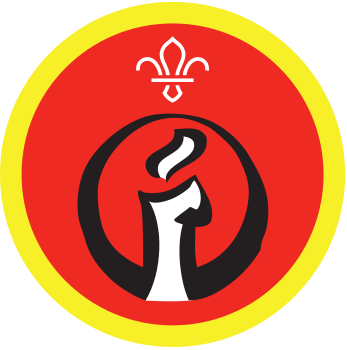
Make a reflections paper chain
You’ll need
- A4 paper
- Coloured pens or pencils
- Scissors
- Glue sticks
Scouts is open to everyone. We don’t identify exclusively with one faith, and we welcome people of all faiths and of none.
We know it’s important for people to learn about each other, including understanding different faiths and beliefs. Scouts always respects people’s beliefs, faiths and cultures, and everyone should be open to learn.
As an inclusive and values based movement, we support our members to engage and learn about different faiths and beliefs in an exciting and meaningful way, even if they don’t have a faith themselves.
Celebrating and understanding differences, including differences in faiths and beliefs, is an important part of our Scout values, which are:
- Integrity: We act with integrity; we are honest, trustworthy and loyal.
- Respect: We have self-respect and respect for others.
- Care: We support others and take care of the world in which we live.
- Belief: We explore our faiths, beliefs and attitudes.
- Co-operation: We make a positive difference; we co-operate with others and make friends.
Our value of Belief and its exploration helps Scouts to learn from other faiths and beliefs. This encourages them to develop or build their personal beliefs and understand their shared values, whether faith-based on not.
We know that learning about faiths, beliefs and different attitudes can help to break down barriers, helps us all to recognise what we have in common, and teaches us to value and respect other people. It also helps us to build up respect, acceptance and knowledge for each other, leading to a more co-operative and inclusive society.
In our diverse society, people can sometimes feel cautious talking about this sensitive subject. However, it's important that Scouts offers young people safe, exciting and open spaces to explore faiths and beliefs. They should be able to engage in personal reflection, as they question and develop their opinions and understanding of the world around them.
Making time for personal reflection and developing our beliefs means exploring the places, people, communities, celebrations or stories which hold meaning for us, and it may not necessarily mean exploring a faith.
For example, someone’s shared values may be their Scout Values and that person may choose to reflect on them at important times, such as when they make their Promise. Others may choose to reflect at certain times of the year, such as a faith-based festival, birthdays, meaningful events or at New Year. Some people may still celebrate events, such as Christmas, but use it as a time to celebrate family, friends and loved ones, as well as for charity and giving.
Discover more about Faiths and Beliefs in Scouts.
Why and how do people reflect?
- Some people pray and reflect to say thank you, ask for support, or promise to try and do better.
- Reflecting and praying can help us think about our lives and our place in the world.
- Reflection doesn’t have to be rooted in specific beliefs.
- There are lots of ways to reflect and pray. You could write, read, speak, draw, listen to music, or perform music.
How might people without a faith reflect?
- People who don’t follow a specific faith or belief may choose meditate or sit quietly to reflect. It can be good to be still and quiet and think.
- Scouts values are our shared beliefs and people may choose to reflect on them at important times, such as when they make their Promise.
- People may also choose to reflect at certain times of the year, such as on a birthday, on Mother’s Day or Father’s Day, at Remembrance or in the New Year.
- People with a faith may also have these similar reflections, outside their religious beliefs too.
How might people who have a faith reflect?
- If you’ve a faith or religious belief, you may reflect by praying to a God or religious figure. You may spend time in a place of worship, sing, or read religious texts.
- People who follow a Buddhist faith may spin prayer wheels to help them choose a mantra (a statement, word, or sound) to focus on.
- People who follow an Islamic faith may pray several times a day, using a prayer mat and facing towards the holy city of Mecca. They wash their hands, feet, and head, and say special prayers in the Arabic language. They may also say prayers called duas at any time of the day.
- People who follow a Jewish faith may pray three times a day. They may say a quiet prayer before eating, or if they see something beautiful (such as a tree in blossom).
- People who follow a Hindu faith may use yoga or chanting to reflect and show their devotion towards God.
- People who follow a Christian faith may close their eyes, put their hands together, or kneel to pray. They may make up a prayer or say a prayer like the Lord’s Prayer.
Before you begin
- Use the safety checklist to help you plan and risk assess your activity. Take a look at our guidance to help you carry out your risk assessment, including examples.
- Make sure all young people and adults involved in the activity know how to take part safely.
- Make sure you’ll have enough adult helpers. You may need some parents and carers to help if you’re short on helpers.
Planning and setting up this activity
- Create long paper strips from A4 paper. They should be about 7cm wide and almost 30cm long. You’ll need one or two strips for each person.
- Set out the paper strips and pens on a table.
Talk about reflection
- Gather everyone in a circle and ask them if they know what reflection means. Reflection may want us to do something differently in the future, make us feel thankful for something or someone, or may help us to know what’s important to us.
- Ask people to think about when they last reflected on something or had a moment of reflection, as well as how, when and why they reflected. They may want to think about what it is, how it makes us feel, who they may think of or speak to when reflecting, how they reflect and what they think about.
- Explain that for some people their reflection period may be connected to their faith, if they have one, so they may reflect during prayer or in a place of worship. For people, either with or without a faith, their period of reflection may happen at another time or place, such as at New Year, when making their Scouts promise or at the end of Scout camp, on a birthday, at a special event, after a good thing happens, or at the end of each day.
- Explain that that different people with different backgrounds may pray and reflect.
- Tell everyone that you’re all going to reflect together on what we’re happy and thankful for in our lives.
- Everyone should put out their hand in front of them. First, they should look at their thumb, which is nearest the heart. Everyone should think about people who are important to them, and who are close to their heart, such as their friends and people in their family.
- Next, wiggle the index finger. This finger is the leader. Everyone should think about the people who help to guide and lead them every day, for example, a role model, their teachers, or a parent or carer.
- Then, look the finger in the middle of their hand. This finger stands tall, just like the people in the world who make big decisions or help to make change. Everyone should think about the decisions big leaders make, and how their choices affect other people.
- Next, look at the ring finger. Everyone should think about people who are struggling. They might be unwell or facing other problems. It could be someone they know, someone they heard about on the news or at school, or a character from a book or film.
- Finally, they should look at their little finger—this is for them! They should think about what makes them happy, and how they can do their best in any situation.
Make a paper chain
- Everyone should go to the table with the paper and pens.
- Take a strip of paper and, remembering what you thought about, write or draw a reflection.
- Some people may want to write or draw some of the people they thought about, doodle things they’re hoping for, such as someone to get better, or a positive statement about themselves, such as ‘I’m creative’ or ‘I’m a good friend’.
- Ask everyone to decorate their paper as much as they want to.
- Everyone should get back into a circle with their strips. If anyone wants to, they can share some or all of their reflection with everyone else.
- Together, start the paper chain making. The first person should put some glue on one end of their strip, and stick the ends together to make a loop. The next person should thread their paper strip through the first person’s loop, and glue it to make a loop of their own.
- Everyone should take it in turns to add their paper strip as a loop, until all of the strips are linked together in a long paper chain.
- You can then decide what to do with the paper chain. Will you display it? Could you add a reflection to it each week? Or, will you save it for special occasions, such as making Scout Promises?
Reflection
This activity was a chance to think about what you’re thankful for or help with any worries. Anyone can reflect—it’s a chance to think about the good things in our lives and what we want to improve or change.
Take a moment to think quietly about what you put on your paper. Why did you choose those things? How do they make you feel?
For this activity to work, you also needed to respect others, as they may have a different reflection or way of reflection to you.
How did you show you respect others? Did you listen while others were talking or ask thoughtful questions?
Have a look at your long chain of reflections. They all link together, even though they’re different. Do you think people share some of the same reasons for reflecting?
Safety
All activities must be safely managed. You must complete a thorough risk assessment and take appropriate steps to reduce risk. Use the safety checklist to help you plan and risk assess your activity. Always get approval for the activity, and have suitable supervision and an InTouch process.
- Scissors
Supervise young people appropriately when they’re using scissors. Store all sharp objects securely, out of the reach of young people.
- Glue and solvents
Always supervise young people appropriately when they’re using glue and solvent products. Make sure there’s plenty of ventilation. Be aware of any medical conditions that could be affected by glue or solvent use and make adjustments as needed.
People could talk and share in smaller groups.
- No one has to share anything if they don’t want to. Help everyone remember that beliefs are personal, and that they should be gentle and think about other people’s feelings.
- You don’t need to have a particular faith to join in with this activity. There are lots of examples of pieces of non-religious reflective writing, such as stories, poems, and songs. It may help to share some examples of these.
- Think about sensitive situations before you begin. For example, you may want to avoid using the example of illness if someone has an ill family member.
All Scout activities should be inclusive and accessible.

